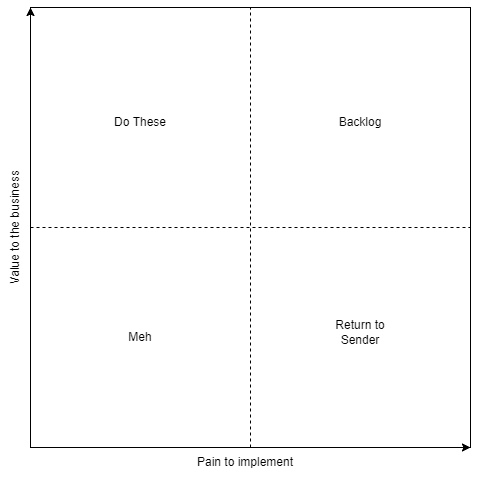
Anybody operating a business in the tech sector right now is looking at the current economic climate and collectively shitting their pants.
Tech stocks are down, the entire sector is undergoing lay-offs and belt-tightening, and we are all worried about growth over the next two years. The thing is, the activities you are doing right now: tightening your cost base, restructuring and finding alternative ways of doing things cheaper, are exactly the right things to do.
In many companies, you will be looking at those big digital transformation projects that you signed-off on last year and you’ll be thinking about scrapping them. Why build all this ecosystem, or create this technical debt in a season where you need to maintain and increase revenue against the tide?
Out in front, your project is probably bloated, overpriced and over-scoped. It is the nature of any long-running software project to experience bloat and scope creep. What you have been given with this recession is a fantastic opportunity to cut scope and – more importantly – speed up time to market.
If that project is being built in-house, your team will probably be more productive by cutting the scope down to the pure value-adds. If you are outsourcing, this is a great time to renegotiate the costs of the project. Your systems integrator is at the sharp end of this recession, and this is an opportunity to get more for less.
I know that sounds ruthless…
Be like water
The most critical thing a business can do in terms of software work is to ensure that the teams and their processes are flexible. If your processes are not flexible, you will not adapt fast enough, and if your teams cannot adapt to change quickly, they will not be able to cope with sudden scope changes.
Of course, in the world of APIs, ensuring the easy consumption of your value-add services by your customers and efficient integration between all of your systems is critical at any time, but when you find the project at risk because of a crappy economy, you need to act fast to triage the value you can bring to market now, not later.
In software, this is the ultimate trade-off: high-quality, highly-tuned, perfect output (the Apple product mantra), or fast-moving, nimble and highly adaptive product evolution (think Jeet-Kune-Do but for product). When times are tough, the former approach tends to flounder without deep pockets, while the flexible approach will always adapt.
The Practical Bit:
So let’s talk about scope – my co-founder is a massive proponent of the Eisenhower-Matrix method of prioritising jobs-to-be-done. (I highly recommend it, too – if you haven’t heard of it, click the link to get a sense of how it works, then come back).
This method is fantastic for ruthlessly identifying your real priorities.
To work it through the matrix – take each feature of your transformation project, write it on a post-it, and then project it onto the Eisenhower Matrix. Everything critical to the business now ends up in the “important and urgent” matrix. Ta-da!
Now you can augment it by running a second analysis on your things-to-do-now quadrant that I call the PITA-test (copyright, trademark, patent-pending, casque-marque):
Take your important and urgent tasks, and now rearrange them on the PITA-graph, whatever is in your top-left quadrant is your new scope. These are the things that are easy to do and high-value.
You’ve now very quickly built a reduced scope for your digital transformation project that you can be sure will add the most value, at the most critical time, in the shortest time.
Bringing projects like these to market in more pressing times forces decision-makers to make the best with less. It also enables you to be laser-focused on what your customers (internal or external) really want.
This, in turn, means your business can thrive and ultimately have an awesome product or project optimised for your market when your economic outlook looks rosier – that’s a head start on everyone else.
With that being said, what are other leaders doubling down on, cutting back, or moulding into a new shape? Let me know your thoughts.


